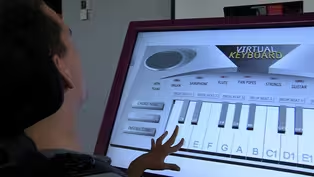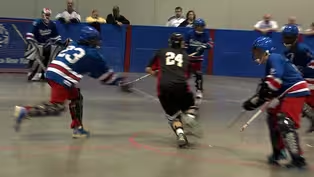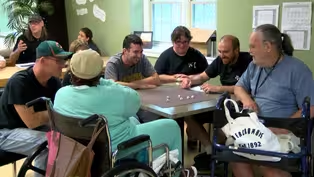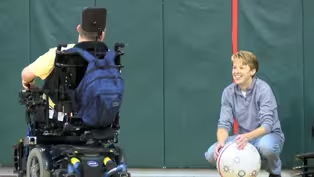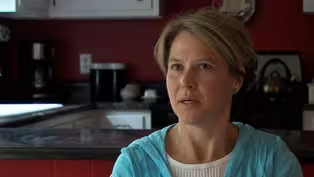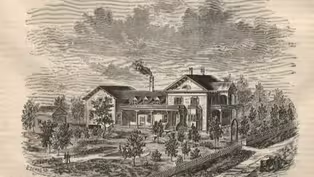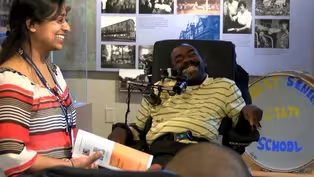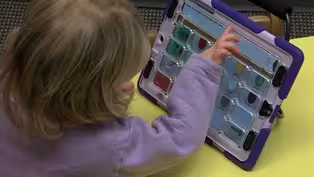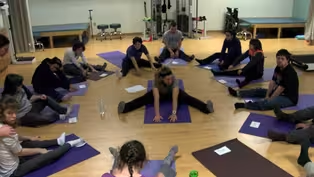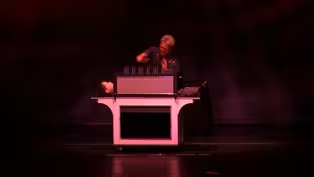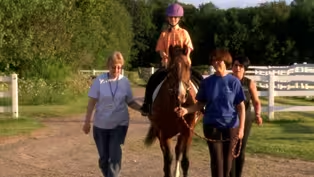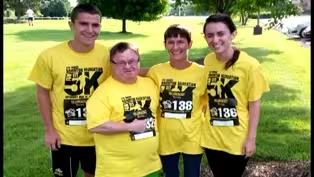Move To Include
Science Career
Special | 2m 55sVideo has Closed Captions
Genomics and how scientists use computers to analyze data.
We head over to the University of Rochester to learn about genomics and how scientists use computers to analyze data.
Problems playing video? | Closed Captioning Feedback
Problems playing video? | Closed Captioning Feedback
Move To Include is a local public television program presented by WXXI
Move To Include
Science Career
Special | 2m 55sVideo has Closed Captions
We head over to the University of Rochester to learn about genomics and how scientists use computers to analyze data.
Problems playing video? | Closed Captioning Feedback
How to Watch Move To Include
Move To Include is available to stream on pbs.org and the free PBS App, available on iPhone, Apple TV, Android TV, Android smartphones, Amazon Fire TV, Amazon Fire Tablet, Roku, Samsung Smart TV, and Vizio.
More from This Collection
Homework Hotline, designed for grades 4 through 12, provides the tools students need to succeed both in and out of the classroom, & supports academic achievement across a variety of learning standards. This collection is specifically curated by Move to Include & presents in-depth stories & profiles of individuals & organizations who are working to make our community inclusive & accessible for all.
Video has Closed Captions
How touch screen technology is making learning more accessible for all students. (2m 58s)
Video has Closed Captions
See how floor hockey is helping these players both in and out of the rink. (2m 16s)
Video has Closed Captions
A program that specializes in working with individuals suffering from traumatic brain injury. (4m 6s)
Video has Closed Captions
Recreational activities through adaptive sports and inclusive recreation. (5m 27s)
Video has Closed Captions
Kerrie Giesen tells us what it is like to have Multiple Sclerosis and how her life has changed. (3m 11s)
Video has Closed Captions
Many people with disabilities were sent to live in institutions away from their families. (2m 28s)
Video has Closed Captions
Charles uses eye gaze technology and a device called a Dynavox to help him communicate. (2m 21s)
Video has Closed Captions
How speech pathologists help children with communicative disorders. (2m 25s)
Video has Closed Captions
Using magic tricks to help therapists provide better care to people with disabilities. (4m 24s)
Video has Closed Captions
Equine assisted therapy. Learn about the benefits of working with horses. (2m 37s)
Video has Closed Captions
We ask Pat and his family how Down Syndrome has impacted their lives. (2m 40s)
Providing Support for PBS.org
Learn Moreabout PBS online sponsorshipMy name is Luticha andre Doucette, and I am a visiting scientist at the University of Rochester in the Warren Lab.
And what we do here in the Warren Lab is we study genomics, which is studying the DNA and RNA of living creatures.
I am a bioinformatics.
We use computer science in order to interpret biology from that perspective.
So we have a lot of data that gets generated in the lab and I help to interpret that data with computers.
What we do here is study a model organism called the Soni of the Troponins, and this is a tiny little wasp that stains the pupa of a type of fly, and then that sting injects venom and the eggs into the pupa.
We want to know, what is it that I'm doing?
How is it acting upon the host?
And can we then use that to create drugs to help other people?
What I love about science is that there are so many questions to answer.
It's kind of like having a infinite number of boxes.
You don't know what's inside of them, but you try your best to open each one and to figure out what's inside.
Every day there's a new challenge.
Every day I'm learning something new.
Every day I'm learning something new about myself.
And that personal growth has been great as well.
So just being able to explore and to know that I can solve a problem and I can make a difference in people's lives just by doing things.
So there are a lot of myths about people with disabilities, and I think the biggest one is that we aren't capable.
Even the word disabled handicap really means the inability to function.
But just because your legs don't work, your hands don't work.
Or even for someone like myself who may have had a brain injury at one time, does it mean that you are incapable of functioning?
It means you have to adapt.
And at the end of the day, people with disabilities are people.
We're human and we come in a variety of flavors just like anyone else.
And so therefore, we are not bound by our disability.
We are capable of achieving what we want to achieve, but we need a little bit of help along the way.
Treat us like you would anyone else.
And that goes a long way to creating that idea of community.
We shouldn't be outside.
We belong inside the hole that because.
Support for PBS provided by:
Move To Include is a local public television program presented by WXXI
